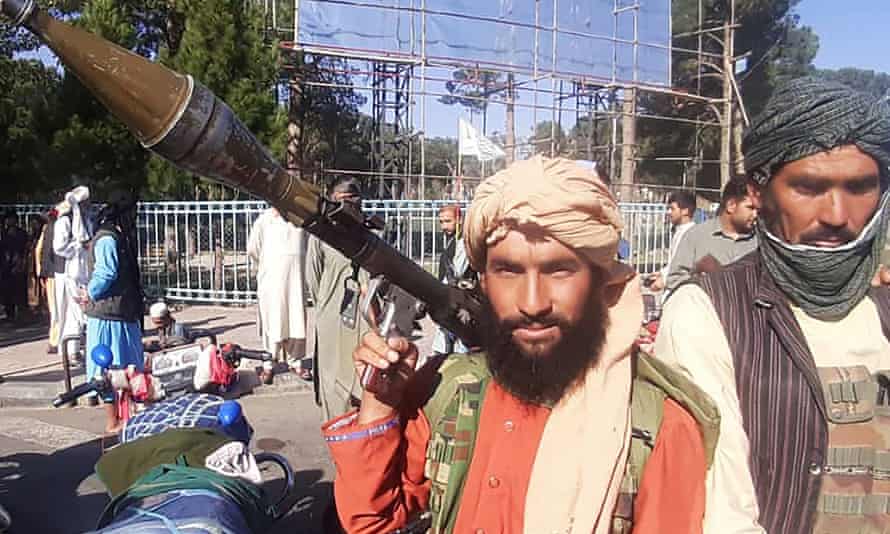Observer editorial, London, 15 August 2021
The Taliban’s rapid advance is chilling but a united response can still avert catastrophe
 A Taliban fighter, armed with a rocket-propelled grenade, enters Herat, Afghanistan’s third biggest city.Photograph: AFP/Getty Images
A Taliban fighter, armed with a rocket-propelled grenade, enters Herat, Afghanistan’s third biggest city.Photograph: AFP/Getty Images
The fall of Afghanistan to fundamentalist Taliban forces is a disaster foretold. Although the capital, Kabul, remains in government hands, the scale and speed of the insurgents’ advance has left no doubt who now holds the upper hand. This swift implosion is likened to the final days of the Vietnam war, when the Viet Cong overran Saigon in April 1975. If what the world is witnessing is the moral as well as the physical collapse of a nation, the fall of France in June 1940 may be the better analogy.
The success, though not the startling rapidity, of the Taliban’s many-fronted offensive in seizing key provincial capitals and much of rural Afghanistan was predictable once it became clear, in June, that residual US forces were rushing to leave. The foolish, unilateral American decision to quit at short notice effectively obliged Britain and other Nato allies to follow. It wrongfooted government forces. It gave Taliban leaders the opening they had awaited for 20 years.
The resulting shock waves are widely felt. Joe Biden bears immediate responsibility for a preventable reversal that will have lasting, deeply negative consequences for the longsuffering Afghan people and for western security. But this
failure is shared with previous US presidents who took their eye off the ball in the years after al-Qaida’s 9/11 attacks – and especially with Donald Trump, whose unbelievably inept, self-serving “peace deal” with Taliban leaders in Doha last year paved the way for capitulation.
Britain, America’s steadfast but unconsulted ally, also faces searching questions about what was achieved and what happens next. Boris Johnsonand Ben Wallace, the defence secretary, claim the occupation prevented more al-Qaida attacks and advanced women’s education. But Wallace also admits there is a resurgence of al-Qaida in Afghanistan, as well as of Islamic State fanatics, which is a looming worry. It’s obvious the job is incomplete – and that what good has been done may quickly be undone.
It’s a pity that Wallace’s sharp criticism of the US – he described Trump’s Doha giveaway as a “rotten deal” and the withdrawal as a “mistake” – was not more clearly articulated when there was time to do something about it. His admission that he tried and failed to persuade France and Germany to help maintain a military presence starkly illustrates the limitations of “global Britain”. Without the US, and estranged from Europe, Britain was powerless.
An enormous humiliation has also been inflicted on Ashraf Ghani, the Afghan president. His uninspiring, ineffective political leadership has been cruelly exposed. Yet it’s also true that he was seriously weakened when Trump excluded his government from the Doha talks. The inclusive democracy that many Afghans, western governments and NGOs strove so hard to establish is in mortal danger as a result. In fact, it’s dying before our eyes.
Ordinary Afghans have more basic concerns. They watch fearfully as Taliban fanatics begin to violently reorder their lives, imposing regressive Islamic law, restricting access to education and persecuting women. Their priority is survival amid record civilian casualties. Their ordeal can only be imagined. Former minister Rory Stewart rightly speaks of “betrayal”. In a country where the average age is 18, millions of people who reject Islamist bigotry face the prospect of a nightmarish future under the yoke of a medieval feudal state.
The full repercussions of this disaster are only beginning to be felt. Hundreds of thousands of people are already internally displaced. Many have fled to Kabul. If the capital falls, waves of frightened, dispossessed and hungry people could surge into Pakistan, Iran and the central Asian republics from a country the United Nations warns is “spinning out of control”. It may only be a matter of time before huge, twin humanitarian and refugee emergencies impact Europe and destabilise the wider region.
Perhaps, at last gasp, catastrophe may be averted. It’s possible Kabul will hold, that Ghani’s demoralised army will make a stand and even repulse the insurgents. It’s possible the Taliban, split between opposing groups of fundamentalists and pragmatists, fighters and ideologues, will voluntarily halt their advance, accept a power-sharing deal, or fall out among themselves. It’s even possible Biden, under pressure to make amends, will send back bombers and drones to help stem the tide.
But none of this is likely to make a lasting difference unless the international community urgently comes together. Why are so many countries passively looking on? Why is the UN security council fiddling while Afghanistan burns? All the main players share an interest in peace. China and Russia fear the jihadist contagion. Both India and Pakistan, in theory, desire stability. Sanctioned, Covid-hit Iran can no more afford a refugee crisis on its eastern border than can Turkey or the EU.
An outcome that salvages Afghan democracy, secures basic human rights and provides guarantees against future jihadist threats is in everyone’s interest. Even now, if the world truly wants it, Afghanistan can be pulled back from the totalitarian, terrorist abyss – and the Taliban brought to heel. António Guterres, the UN secretary general, is demanding an immediate ceasefire, followed by “good faith” negotiations. For all our sakes, he must be vigorously supported.
The Observer
